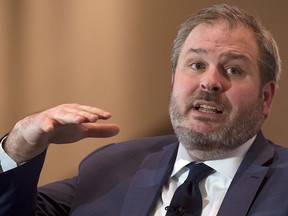Article content
We may be in for some rocky months, but a recession later this year could ultimately help jostle the economy back to a state of normalcy, the Bank of Nova Scotia’s chief economist said this week.
Scotiabank chief economist says downturn could jostle the economy into a more normal, productive future
Published April 21, 2023 • 3 minute read

We may be in for some rocky months, but a recession later this year could ultimately help jostle the economy back to a state of normalcy, the Bank of Nova Scotia’s chief economist said this week.
This advertisement has not been loaded yet, but your article continues below.
Subscribe now to read the latest news in your city and across Canada.
Subscribe now to read the latest news in your city and across Canada.
Create an account or sign in to continue with your reading experience.
Speaking at the Canadian Fintech Summit in Toronto on April 19, Jean-François Perrault made the case that the past decade-plus has been anything but normal, in economic terms.

Sign up to receive the daily top stories from the Financial Post, a division of Postmedia Network Inc.
A welcome email is on its way. If you don’t see it, please check your junk folder.
The next issue of Financial Post Top Stories will soon be in your inbox.
We encountered an issue signing you up. Please try again
Central banks first kept interest rates at historic lows following the global financial crisis in 2008 and then boosted them rapidly in the post-pandemic period to stamp out high inflation. That has created economic imbalances.
But the recycling capital that takes place during a recession — and Perrault, like a number of other leading economists, expects one this year — could reset things.
“(A recession) does create conditions for a different perspective on risk appetite, a different perspective on where capital comes from, and despite the fact that things are slowing down, to some extent, the greater diversification of where capital is going into the economy ,” Perrault said. “And that, I think, ultimately is a very positive thing. It actually sets the stage for rebound after the recession.”
This advertisement has not been loaded yet, but your article continues below.
Some firms will not survive the economic accounting, of course.
“But as those firms fail, as firms exit certain sectors, it creates opportunities for others or allows capital to move from one part of the economy where it’s less productive, to another part of the economy where it’s more productive,” he said.
In a more normalized environment, he sees the Bank of Canada leaving interest rates in the two to three per cent range, which would be in line with the central bank’s neutral rate range, which is meant to neither contribute to nor hinder economic growth. In this return to normal, Perrault also expects that risk appetite will grow.
To get to that two to three per cent range, the bank will have to reverse course and start cutting interest rates.
This advertisement has not been loaded yet, but your article continues below.
For the past two monetary policy decisions, it has kept rates on hold to assess how the cumulative 4.25 per cent increase since early 2022 has affected the economy. Rate increases have a lagging impact and many economists believe the full brunt of the rate increases has not been felt.
“We are at a point now where the conversation is much more about when are central banks going to cut rates and how low do they go once they start cutting,” Perrault said. “And this is where history is a little bit of a tricky thing. We think, for example, the Bank of Canada and the Fed will start cutting rates early next year.”
The Bank of Canada expects it will reach its goal of bringing inflation down to its two per cent target from the March reading of 4.3 per cent by 2024. It’s not clear whether the central bank will cut rates in that same timeframe, but it appears to be what markets are pricing in and what economists are expecting. However, governor Tiff Macklem said it was too soon to be talking about rate cuts right now.
This advertisement has not been loaded yet, but your article continues below.



Perrault said that while the central banks won’t come out and say it, a recession seems to be just what the doctor ordered.
“Central banks are a little bit late to the game, so they are tightening a little bit too slowly and as a result, they have to raise rates more than we anticipated,” Perrault said. “Now, they’re not going to go out there and say ‘We want to create a recession’ — of course not. But the reality is that when the central bank has historically tightened a lot, and there are a few episodes of this, they tend to trigger recessions.”
• Email: [email protected] | Twitter: StephHughes95
Breadcrumb Trail Links News economy Scotiabank chief economist says downturn could jostle the economy into a more normal, productive future Get the latest from Stephanie Hughes straight to your inbox Signup Published April 21, 2023 • 3 minute read Scotiabank chief economist Jean-François Perrault says that while the central banks won’t come out and say…

WhatsApp us
Comments
Postmedia is committed to maintaining a lively but civil forum for discussion and encourages all readers to share their views on our articles. Comments may take up to an hour for moderation before appearing on the site. We ask you to keep your comments relevant and respectful. We have enabled email notifications—you will now receive an email if you receive a reply to your comment, there is an update to a comment thread you follow or if a user you follow comments. Visit our Community Guidelines for more information and details on how to adjust your email settings.
Join the Conversation